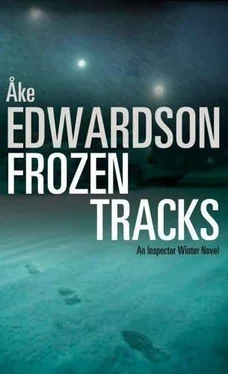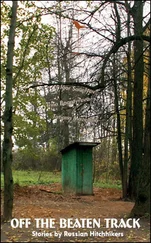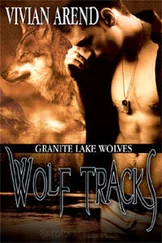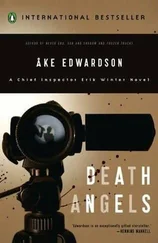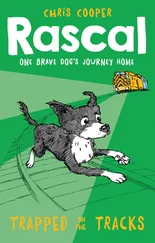“We’ll do it in a few days’ time,” he said.
“Don’t fool yourself,” she said.
He didn’t respond.
“We’ve both hidden a Christmas present for you somewhere in the apartment,” she said.
“You’ll never find mine!” said Elsa.
“Animal, vegetable, or mineral, or somewhere in between?” he said.
“Fish!” Elsa shouted.
“It’s a secret, Elsa!” said Angela.
“Is it easy to find the packages?” Winter asked.
“There’s a letter in the kitchen with clues,” said Angela.
***
The taxi was waiting. The snow had gone, but the sun was there, located quite low in the blue expanse.
“Daddy is coming as well,” said Elsa as she got into the car. She looked miserable.
What am I doing? Winter thought.
The driver crammed the bags into the trunk. He glanced at Winter. He’d heard.
Winter’s mobile rang in his inside pocket-two, three rings.
“Aren’t you going to answer?” asked Angela from the backseat, through the open door.
He saw “private number” on the display, and answered. It was Paul Waggoner, Simon’s father: “I just wanted to check what time we could expect you,” he said.
Winter exchanged a few words with him, then hung up.
“I’ll take you to the airport,” he said, starting to take the bags out of the trunk.
“Merry Christmas,” said the taxi driver, as he prepared to drive his empty car away.
Winter and Elsa sang Christmas carols all the way to Landvetter airport.
The check-in line was shorter than he’d expected.
Angela smiled and waved from the escalator up to the terminal. He needed that. She was a good lady. She understood.
The question was how much she understood, he thought, as he drove back to Gothenburg from the airport. On the way he listened to the news reports about his own reality. Now that was his whole world.
WINTER CAME TO THE ROUNDABOUT AT LINNÉPLATSEN, CONTINUED along the service road, and turned off toward Änggården.
The Waggoners lived in one of the English-type town houses. Of course. There was a Christmas tree outside the front door. There was still snow on the lawn, a thin rectangular drift that could have been a snowman once upon a time. Winter thought he could make out an orange carrot as he rang the doorbell. He rang again. He was carrying his equipment himself.
Simon Waggoner had not spoken, not drawn anything, not said anything about what had happened. It hadn’t worked in the room they’d set up at police headquarters. Maybe it would work now.
When a child is about one, it communicates in single words; at about eighteen months it starts using two-word sentences, and later it uses three-word sentences. He knew that from the interrogations he’d conducted with children, and from the literature. Christianson, Engelberg, Holmberg:
Advanced Interview and Interrogation Methodology.
And he knew from his conversations with Elsa.
He knew that a child’s language exploded between the ages of two and four.
After the age of two a child is aware that it is an individual in its own right.
The child can start to link its experiences to a concept of itself, and explain to others what it has experienced. It has a memory. It is possible to find that memory, find paths leading to it. Forgetfulness disappears as language develops.
Four-year-olds can talk about experiences they have been through.
Simon Waggoner was four. He was nowhere to be seen as Winter stood in the hall, greeting the parents, Paul and Barbara. There was a smell of Christmas spices in the house, but not quite the same as in a typical Swedish home. Perhaps there was a Christmas pudding on the stove, slowly cooking for another few hours.
“Simon is very tense,” said Paul Waggoner.
“I understand that,” said Winter.
“As far as we can gather he’s been telling his teddy bear what happened,” said Barbara Waggoner. “He confides in his teddy bear.” She looked at her husband. “I don’t know what we should make of that.”
“The teddy bear can be present at the interview,” said Winter. “What’s his name?”
“Billy.”
Billy can do the talking, Winter thought. Billy can talk via Simon.
“We’ve prepared the guest room,” said Barbara Waggoner. “We moved some of the furniture.”
“Is Simon used to being in the room?”
“Oh yes. He’s in there every day. He likes to sit there drawing.”
“Good.”
“Follow me, I’ll take you to it.”
The room was on the ground floor. They passed through the kitchen, which was big and light and had a window facing east. Sure enough something was cooking in a large saucepan, and it wasn’t a Christmas ham. There were newspapers and drawing paper and colored pencils on the kitchen table, various small molds, wrapping paper, and a stick of sealing wax. Two candles were burning in low candlesticks. There were Advent candles in the window, with three of them burning. The fourth one would be lit tomorrow, on Christmas Eve. But being an English family, their main celebration would be the day after, on Christmas Day. With full stockings in the morning.
The radio was murmuring away on the kitchen counter, just as in Winter’s flat, and he recognized the BBC voice, dry, reliable, clear. Facts, no rumors.
He hoped the Waggoners would avoid reading the newspapers, miss all the rumors and speculation.
The guest room was good, out of the way, no voices audible from elsewhere. No distracting toys on the floor or table, no Christmas decorations.
“Good,” said Winter again.
“Where shall I put the tripod?” asked Paul Waggoner.
“We need the camera to be as far away from Simon as possible,” said Winter. “But he must be able to see it.”
They placed it against the north wall, in the middle, clearly visible. Winter would work it himself, using the remote control.
The picture would have to contain both himself and Simon all the time, it was the interplay between them that had to be documented; he would need to keep coming back to the recording to see if something he did, some movement or other, affected the boy.
And he needed to capture Simon’s face, his body movements. The technology would assist him; he had the latest camera, which enabled him to focus on Simon’s face in a separate picture.
“It’s ready,” said Winter. “I’m ready.”
He went out of the room and waited in the little hallway that led to the staircase. There was a window in the wall behind, so he couldn’t really see Simon’s face properly as he came down the stairs against the light, holding his mother’s hand.
This wasn’t the first time Winter had met Simon. It might have been the third time, possibly the fourth.
He squatted down so that he could greet Simon at eye level.
“Hi, Simon.”
The boy didn’t answer. He clung to his mother’s hand and took a step to one side, diagonally backward.
Winter sat down on the floor, which was polished and varnished wood, possibly pine. It was soft.
Simon sat down on Barbara Waggoner’s knee. After a short while he slid down onto the floor.
He was holding Billy tucked under his arm. The teddy bear’s eyes were aimed straight at Winter.
“My name’s Erik,” Winter said, “and we’ve met before, haven’t we?”
Simon didn’t answer. Clung to his teddy bear.
“What’s your teddy called?” Winter asked.
The boy looked at his mother, who nodded and smiled.
“I used to have a teddy called Willy,” said Winter. It was absolutely true. It suddenly occurred to him that there was a photograph of Willy in the family album, with Winter wearing overalls, sitting and looking up at something outside the picture, holding the teddy bear with his left hand. When had he last looked at it? Why hadn’t he shown it to Elsa yet?
Читать дальше
